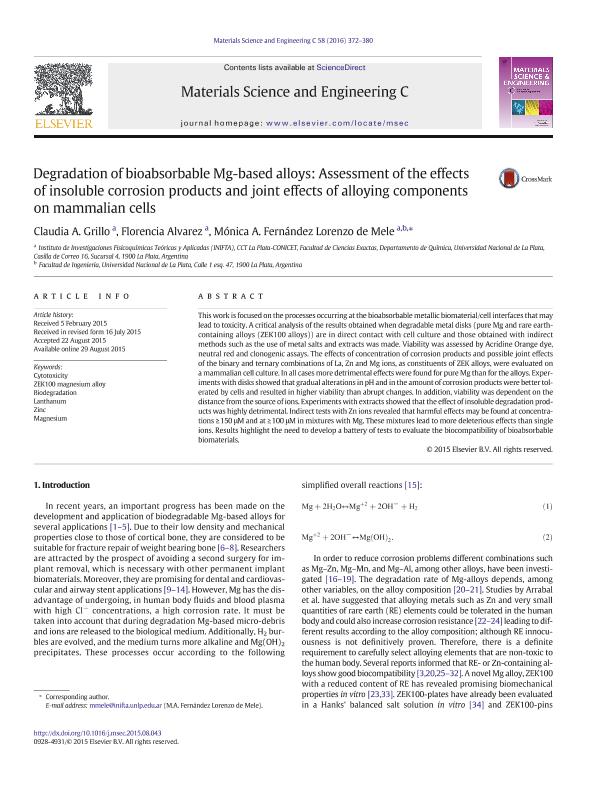Mostrar el registro sencillo del ítem
dc.contributor.author
Grillo, Claudia Alejandra

dc.contributor.author
Alvarez, Florencia

dc.contributor.author
Fernandez Lorenzo, Monica Alicia

dc.date.available
2016-04-04T21:00:30Z
dc.date.issued
2015-08
dc.identifier.citation
Grillo, Claudia Alejandra; Alvarez, Florencia; Fernandez Lorenzo, Monica Alicia; Degradation of bioabsorbable Mg-based alloys: Assessment of the effects of insoluble corrosion products and joint effects of alloying components on mammalian cells; Elsevier; Materials Science & Engineering. C, Biomimetic Materials, Sensors And Systems; 58; 8-2015; 372-380
dc.identifier.issn
0928-4931
dc.identifier.uri
http://hdl.handle.net/11336/5043
dc.description.abstract
This work is focused on the processes occurring at the bioabsorbable metallic biomaterial/cell interfaces that may lead to toxicity. A critical analysis of the results obtained when degradable metal disks (pure Mg and rare earthcontaining alloys (ZEK100 alloys)) are in direct contact with cell culture and those obtained with indirect methods such as the use of metal salts and extracts was made. Viability was assessed by Acridine Orange dye, neutral red and clonogenic assays. The effects of concentration of corrosion products and possible joint effects of the binary and ternary combinations of La, Zn and Mg ions, as constituents of ZEK alloys, were evaluated on a mammalian cell culture. In all cases more detrimental effectswere found for pureMg than for the alloys. Experiments with disks showed that gradual alterations in pH and in the amount of corrosion productswere better tolerated by cells and resulted in higher viability than abrupt changes. In addition, viability was dependent on the distance fromthe source of ions. Experimentswith extracts showed that the effect of insoluble degradation products was highly detrimental. Indirect tests with Zn ions revealed that harmful effects may be found at concentrations ≥150 μMand at ≥100 μM in mixtures with Mg. These mixtures lead to more deleterious effects than single ions. Results highlight the need to develop a battery of tests to evaluate the biocompatibility of bioabsorbable biomaterials.
dc.format
application/pdf
dc.language.iso
eng
dc.publisher
Elsevier

dc.rights
info:eu-repo/semantics/openAccess
dc.rights.uri
https://creativecommons.org/licenses/by-nc-sa/2.5/ar/
dc.subject
Cytotoxicity
dc.subject
Zek 100 Magnesium Alloy
dc.subject
Biodegradation
dc.subject
Lanthanum
dc.subject.classification
Biomateriales

dc.subject.classification
Biotecnología de la Salud

dc.subject.classification
CIENCIAS MÉDICAS Y DE LA SALUD

dc.title
Degradation of bioabsorbable Mg-based alloys: Assessment of the effects of insoluble corrosion products and joint effects of alloying components on mammalian cells
dc.type
info:eu-repo/semantics/article
dc.type
info:ar-repo/semantics/artículo
dc.type
info:eu-repo/semantics/publishedVersion
dc.date.updated
2016-05-06 15:52:43.262787-03
dc.journal.volume
58
dc.journal.pagination
372-380
dc.journal.pais
Países Bajos

dc.journal.ciudad
Amsterdam
dc.description.fil
Fil: Grillo, Claudia Alejandra. Consejo Nacional de Investigaciones Científicas y Técnicas. Centro Científico Tecnológico la Plata. Instituto de Investigaciones Fisicoquímicas Teóricas y Aplicadas; Argentina. Universidad Nacional de la Plata; Argentina
dc.description.fil
Fil: Alvarez, Florencia. Consejo Nacional de Investigaciones Científicas y Técnicas. Centro Científico Tecnológico la Plata. Instituto de Investigaciones Fisicoquímicas Teóricas y Aplicadas; Argentina. Universidad Nacional de la Plata; Argentina
dc.description.fil
Fil: Fernandez Lorenzo, Monica Alicia. Consejo Nacional de Investigaciones Científicas y Técnicas. Centro Científico Tecnológico la Plata. Instituto de Investigaciones Fisicoquímicas Teóricas y Aplicadas; Argentina. Universidad Nacional de la Plata; Argentina
dc.journal.title
Materials Science & Engineering. C, Biomimetic Materials, Sensors And Systems

dc.relation.alternativeid
info:eu-repo/semantics/altIdentifier/pmid/26478323
dc.relation.alternativeid
info:eu-repo/semantics/altIdentifier/url/http://www.sciencedirect.com/science/article/pii/S0928493115302897
dc.relation.alternativeid
info:eu-repo/semantics/altIdentifier/url/http://www.ncbi.nlm.nih.gov/pubmed/26478323
dc.relation.alternativeid
info:eu-repo/semantics/altIdentifier/doi/10.1016/j.msec.2015.08.043
dc.relation.alternativeid
info:eu-repo/semantics/altIdentifier/doi/http://dx.doi.org/10.1016/j.msec.2015.08.043
Archivos asociados
